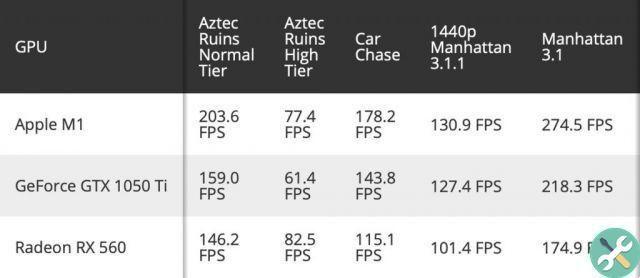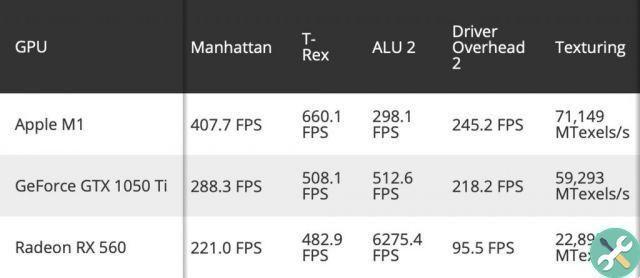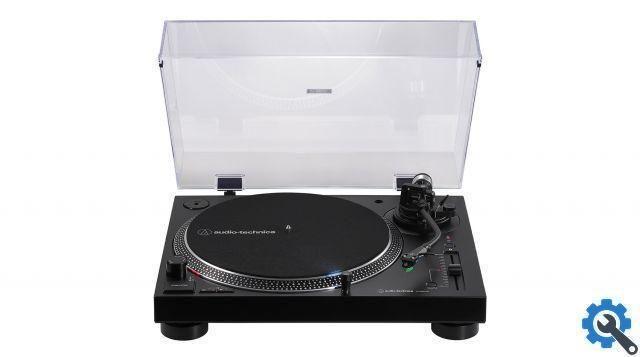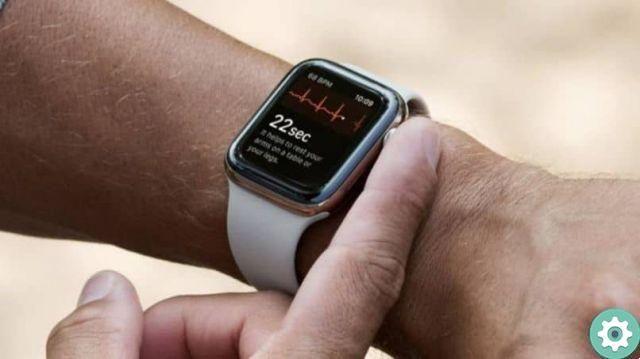On November 10, Apple kept its word and unveiled the first three computers with its M1 system on a chip, designed specifically for computers.
Apple's share is very high and has spared no (one-sided) comparisons about how far its performance is compared to the vague “best-seller in the industry” or “98% of PCs sold last year”.

However, it is not a laboratory product. Computers are sold and users can compare and use speed measurement and processing programs to draw their own conclusions.
For now the conclusion is clear: Apple does not sell smoke and the M1 chip offers a really noticeable performance improvement, both compared to the Intel chips that Apple uses in their machines and compared to other graphics cards.
The M1 chip outperforms the GeForce GTX 1050 Ti and Radeon RX 560 graphics cards.
Apple's M1 processor often outperforms computer GPUs such as the Nvidia GeForce GTX 1050 Ti and AMD Radeon RX 560, according to new tests discovered by Tom's Hardware.
According to Apple, the M1's eight-core GPU can handle around 25.000 threads simultaneously and deliver up to 2,6 TFLOPS of performance. That's the same amount achieved by the Radeon RX 560 and just under the 2,9 TFLOPS of the GeForce GTX 1650.

The results of GFXBench 5.0 were tested using the Metal API and show that the M1 often performs better than the Nvidia GeForce GTX 1050 Ti and the AMD Radeon RX 560 by a large margin. There are still no test results for the GeForce GTX 1650 with Metal for a fair comparison.

In tests using Aztec Ruins Normal Tier, the Radeon RX 560 reaches 146,2 FPS, the GeForce GTX 1050 Ti reaches 159 FPS and the M1 reaches 203,6 FPS. Similar results are seen elsewhere, with the M1 consistently outperforming two desktop GPUs.
MacBook Pro with M1 scores 7508 points in Cinebench multicore benchmarks
One of the first customers to receive the 13-inch MacBook Pro with M1, equipped with 8-core CPU, 8-core GPU, 8GB unified memory and 512GB HDD, tested Cinebench R23 to get a better view of the performance.
Cinebench is a more intensive multi-threaded test than Geekbench 5, which tests performance over a longer period of time and can offer a sharper view of how the machine will perform in the real world.
The MacBook Pro M1, which uses multicore, achieved a score of 7508 on Cinebench, while using a single core it achieved a score of 1498, which places it in similar performance to Intel's 11th generation chips.
Cinebench
7508 multi core e 1498 single core #MacbookPro pic.twitter.com/dWaHaQOOqn
– Ali King Fans Intl (@mnloona48_) 16 november 2020
Comparatively, a 16-inch MacBook Pro, released in 2019, with a 9 GHz Core i2,3 chip achieves a multi-core score of 8818, according to a MacRumors player test with the R23 update released last week. The 16GHz 2,6-inch MacBook Pro scored 1113 using a single core and a multi-core score of 6912 in the same test, while the previous generation MacBook Air flagship model scored 1119 on a single core and in multicore a score of 4329.
Cinebench R23 scores can be viewed on the Monkey CPU performance website for both multicore and mononuclear performance.











![Google also wants your Apple News [Updated] [2]](/images/posts/943dc0d8f28fcc4bc16fa30ed6d71f6a-0.jpg)





![Apple Vice Presidents Talk About Development of M1 for Mac [Updated]](/images/posts/c6254b668e5b3884d6b6338ccb8a02ff-0.jpg)








